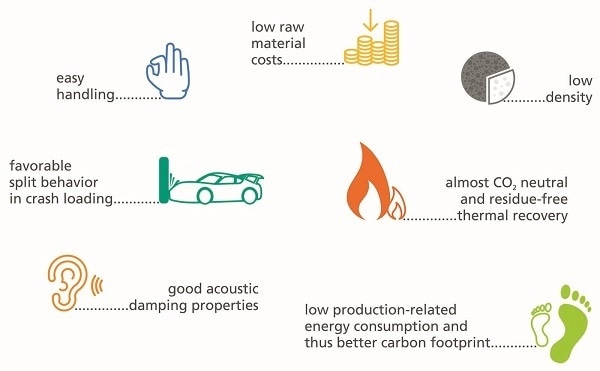The Bioconcept-Car’s driver and passenger doors and rear wing are made using a mixture of organic fibers. Vegetable fibers as a component in organic composites are a sustainable alternative for lightweight vehicle bodies.
The years of experience with the ‘Bioconcept-Car’ were integrated in material development for the parts of the new 718 Cayman GT4 Clubsport, the first car in series production to feature body parts made of a natural-fiber composite material. The driver and passenger doors as well as the rear wing are made using a mixture of organic fibers. And the Cayman is a real lightweight, weighing in at only 1320 kilograms. A factor here is the 60-percent weight saving resulting from the use of organic composite materials instead of steel in the doors.
The composite material consists of a thermoset polymer matrix system reinforced with organic fibers. An organic fiber mesh is used because the raw materials are readily available, it exhibits high tensile strength, and is particularly fine, homogenous and drapable, easily fitting part shapes. The ease with which it can be produced to precise dimensions facilitate machining and quality assurance, even in combination with other conventionally manufactured components.
Porsche Starts Series Production
Joining forces with Porsche Motorsport, scientists at Fraunhofer WKI first tested organic materials for series readiness under extreme conditions on a Porsche Cayman GT4 Clubsport using the mobile development laboratory of the German “Four Motors” racing team.
“The third generation of the ‘Bioconcept-Car’ has been on the racetrack since 2015. The tests combine the advantage of extreme stress with a vehicle that is also street-legal after modifications. The partnership with Porsche AG also enables development under the realistic conditions of an automobile manufacturer,” says Ole Hansen, project manager at the Fraunhofer WKI Application Center for Wood Fiber Research HOFZET. “We’ve been able to continuously improve the material properties over the last four years.”
The German Federal Ministry for Food and Agriculture BMEL recognized the potential benefits of natural fibers from the very beginning and today still accompanies the project as a strategic partner. The BMEL promotes the development of biogenic light-weight components in the funding program “Renewable Resources” with the central coordinating agency for renewable resources, Fachagentur Nachwachsende Rohstoffe e.V. FNR.
Basis for High-Volume Production
Fraunhofer WKI also considered other factors in its investigations, including concepts for end-of-life recycling or reuse and scale-up approaches for parts that are to be produced in greater quantities.
“After extensive testing under extreme conditions on the racetrack, we continued to evaluate our parts, which ultimately led to the conclusion that these ecologically beneficial organic materials fulfill the criteria for volume production,” Ole Hansen adds. Smudo, front-man of the popular German rap group “Fantastische Vier” and permanent pilot of the Four Motors ‘Bioconcept-Car’, has tested its practical viability, as has a special passenger who enjoyed a test drive on the Nürburgring race course last August: German Federal Minister for Food and Agriculture, Julia Klöckner.
Rising Popularity of Electric Cars
Registration statistics indicate that new cars are progressively becoming heavier, due to improved safety functions and more electronic equipment. This weight gain also means higher levels of fuel consumption, aspects contrary to the general goal of reducing CO2 emissions. Weight is also an important factor for e-cars, since they require larger and thus heavier batteries in order to maximize range, a decisive sales criterium.
Accordingly, new developments in lightweight design are an absolute prerequisite for truly efficient e-cars. According to a study by business consultants at McKinsey, the share of lightweight parts in automobiles will have to rise from 30 to 70 percent by 2030 to compensate for the vehicle weight increase resulting from electric drives and motors.
Good Complement to Carbon Fibers
Researchers at Fraunhofer WKI posed the question of whether other fibrous materials could be used to reduce component weight, only using carbon fibers in those places where they represent a structural advantage. They investigated various readily available ecological materials in terms of their technical properties, availability and cost-efficiency, since a feasible solution for industry must have positive technical, ecological and economic impacts. Natural-fiber-reinforced plastics turned out to be the answer. The biogenic component improves the ecological impact of industrial high-performance composite materials during manufacturing, use and disposal.

Economically speaking, the use of renewable raw materials is beneficial because natural flax, hemp, wood and jute fibers are less expensive than carbon fibers and require less energy to manufacture. Thus, the advantages of weight reduction don’t come with a prohibitive price tag.
Additional advantages in industrial processing and with applications in the vehicle being the naturally grown structure of organic composites gives materials acoustic damping properties and reduces splintering, which is important in the event of a collision.